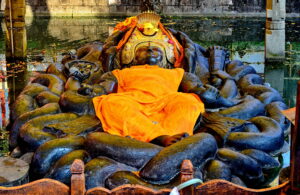The Bhagavad Gita, also known as the Gita, is a 700-verse Hindu scripture that is part of the epic Mahabharata. It is considered one of the most important texts in the Hindu tradition and is considered to be a concise guide to Hindu theology and also a source of inspiration for the spiritual path.
Chapter 1, which is known as “Arjuna Vishada Yoga” or “The Yoga of Arjuna’s Dejection,” begins with the setting of the battlefield of Kurukshetra, where the armies of the Pandavas and the Kauravas are gathered, ready to fight. The main character, Arjuna, a warrior prince and one of the Pandavas, becomes overwhelmed with doubt and despair upon seeing his family and friends on the opposing side. He turns to his charioteer and friend, Lord Krishna, for guidance.
Arjuna expresses his reluctance to fight, saying that he would rather not engage in a war that would lead to the deaths of so many loved ones. He questions the morality of killing one’s own family and friends and wonders what the point of victory would be if it meant the loss of so many lives.
Krishna responds by offering a spiritual perspective on the nature of action and the ultimate goal of human existence. He explains that every living being is a part of the universal soul or Brahman and that the ultimate goal of human existence is to realize this spiritual unity and to become one with the divine.
Krishna also explains that all actions, whether good or bad, have consequences and that it is the person’s intention or motivation behind the action that determines its moral value. He tells Arjuna that it is his duty as a warrior prince to fight for righteousness and that he should not be swayed by personal attachments or emotions.
In conclusion, chapter 1 of the Bhagavad Gita serves as an introduction to the spiritual teachings of the text and lays the foundation for the rest of the book. It presents a moral dilemma that Arjuna faces and the guidance given by Lord Krishna, the ultimate guide, on how to overcome it. It emphasizes the importance of duty and the ultimate goal of human existence, which is to realize spiritual unity and to become one with the divine.
The chapter concludes with Arjuna expressing his readiness to follow Lord Krishna’s instructions and fight the battle.
It’s important to note that Bhagavad Gita’s slokas are full of profound wisdom and are open to multiple interpretations, reading commentaries or studying with a qualified teacher may help in understanding the deeper meaning of each sloka.

